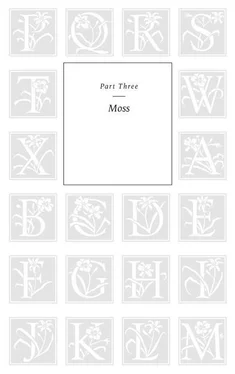Vanessa Diffenbaugh - The Language of Flowers
Здесь есть возможность читать онлайн «Vanessa Diffenbaugh - The Language of Flowers» весь текст электронной книги совершенно бесплатно (целиком полную версию без сокращений). В некоторых случаях можно слушать аудио, скачать через торрент в формате fb2 и присутствует краткое содержание. Жанр: Старинная литература, на английском языке. Описание произведения, (предисловие) а так же отзывы посетителей доступны на портале библиотеки ЛибКат.
- Название:The Language of Flowers
- Автор:
- Жанр:
- Год:неизвестен
- ISBN:нет данных
- Рейтинг книги:4 / 5. Голосов: 1
-
Избранное:Добавить в избранное
- Отзывы:
-
Ваша оценка:
- 80
- 1
- 2
- 3
- 4
- 5
The Language of Flowers: краткое содержание, описание и аннотация
Предлагаем к чтению аннотацию, описание, краткое содержание или предисловие (зависит от того, что написал сам автор книги «The Language of Flowers»). Если вы не нашли необходимую информацию о книге — напишите в комментариях, мы постараемся отыскать её.
The Language of Flowers — читать онлайн бесплатно полную книгу (весь текст) целиком
Ниже представлен текст книги, разбитый по страницам. Система сохранения места последней прочитанной страницы, позволяет с удобством читать онлайн бесплатно книгу «The Language of Flowers», без необходимости каждый раз заново искать на чём Вы остановились. Поставьте закладку, и сможете в любой момент перейти на страницу, на которой закончили чтение.
Интервал:
Закладка:
From downstairs I heard snippets of an argument: Meredith mostly, her voice raised. She has you or she has nothing , she said at one point. It’s bullshit for you to say you want more for her. An excuse . Didn’t Elizabeth know that she was all I wanted? That she was all I would ever want? Huddled under the comforter, I found the summer heat thick and suffocating. I struggled for breath.
I’d been given a chance, a final chance, and somehow, without meaning to, I’d ruined it. I waited for Meredith to march up the stairs and deliver the words I never thought I’d hear: Elizabeth’s given notice. Pack up .
21 .
On Sunday morning, I ate soda crackers and waited for the nausea to subside. It didn’t. I got into my car anyway and drove across the city, vomiting into storm drains on three different occasions. The worldwide population expansion was not a phenomenon I could comprehend as I rolled to a stop at one grate after another.
Grant wasn’t home, as I knew he wouldn’t be. He would be standing behind his truck, handing cut flowers to lines of locals. I had been away only three nights, not an unusually long time for me or for our relationship, and I imagined him hurrying through his work, thinking about the extravagant dinner he planned to create. It would never cross his mind that I would miss a Sunday-night meal. At least I’d warned him, I thought, as I let myself in with the rusty spare key. It wasn’t my fault if he’d forgotten.
Listening for the sound of his truck, I packed quickly. I took everything that belonged to me and many things that didn’t, including Grant’s duffel bag, a large, army-green canvas tube that would camouflage well beneath the heath. I stuffed in clothes, books, a flashlight, three blankets, and all the food he had in the cupboard. Before zipping the bag, I shoved in a knife, a can opener, and the cash he kept in the freezer.
I crammed my belongings into the backseat of my car and went back for my blue photo box, Elizabeth’s dictionary, and the field guide. In the car, I secured them into the front seat with the seat belt and then went back up the spiral staircase to the second floor. I pulled Grant’s orange box off the bookshelf. Opening it, I thumbed through the photos, considering whether or not I should take it. I had made it; everything inside belonged to me. But the idea of having an extra in a safe location comforted me, especially as the next few months of my life would likely be anything but safe. If something happened to my blue box, I could always come back for the orange one.
I left the box in the middle of the floor and withdrew a small square of paper from my backpack. It was folded in half so that it stood up on top of the box like a place marker at a formal dinner. In the center, I had glued a quarter-sized photo of a white rose from a pile of scraps in the blue room, having trimmed it with precision so that only the flower remained. Below the image, in the place where a name would go, I had written a single sentence in permanent ink.
A rose is a rose is a rose .
Grant would understand, if not accept, that this was the end.

1 .
I would go back to the blue room; I would have the baby within its watery walls. I knew this in the same way I knew that Grant was looking for me, without evidence and without doubt. Grant didn’t know the location of the blue room, but he knew enough to find it, I was sure. Until he had given up, I had to stay away. It could take months or most of the year. I was prepared to wait.
No longer squeamish in the presence of intoxicated teenagers, I moved back in to my garden in McKinley Square. I had a knife and a sexual past. They couldn’t attempt anything that hadn’t already been done, and, looking at my reflection in a gas station mirror, I doubted anyone would try. Feeling numb toward both my changing body and my homelessness, I didn’t change my clothes, didn’t seek out showers or wealthy neighborhoods. The weeks began to show on my skin.
I missed Renata, and missed my job, but I couldn’t go back to Bloom. It was the first place Grant would look for me. Instead, I hid under the heath bushes, which had grown and multiplied in my absence. The seeds of heath could exist in the soil for months or years—decades, even—before bursting forth new life, and the familiar plant comforted me as I curled up with Grant’s duffel bag beneath its branches. The rest of my things I left in my car, which I moved to a different street every day. If Grant saw the hatchback, he would recognize it—even with the license plate removed and the blue box well hidden under my belongings—so I kept it far from Potrero Hill, in Bernal Heights or Glen Park, sometimes as far as Hunters Point. I had been sleeping in the park for weeks before it dawned on me that I could sleep in my car at night. But I didn’t want to. The smell of the soil, saturated from overwatering, entered my dreams and calmed my nightmares.
In mid-August, perched at the top of the play structure in McKinley Square, I spotted Grant. He was coming straight up Vermont Street, climbing the hill with his eyes scanning the modern lofts and old Victorians. He stopped and exchanged words with a painter on slanted scaffolding. Turquoise paint dripped from a brush and landed on a drop cloth near Grant’s shoe. He reached down and touched the wet paint, then called something up to the painter, and the man shrugged. Grant was three blocks down the hill, and I couldn’t hear his words, but I could see he wasn’t out of breath even after the steep climb.
I scrambled through the bushes, zipped my bag, and pulled it across the street and into the corner store. When I’d first moved back to McKinley Square, I’d told the store’s owner I was running from an abusive family. I asked him to hide me if my brother ever came looking. The owner had refused, but as time passed and I purchased every meal from his always-empty neighborhood store, I knew I would not be turned away.
The owner looked up when I ran in with my heavy bag and quickly opened the door behind him. I raced around the counter, through the door, and up a flight of stairs. Dropping to my knees, I crawled to the front window of the small, sparsely furnished apartment. The hardwood floor smelled like lemon oil and felt slick against my shins. The walls were painted bright yellow. Grant would not look up twice.
Crouching low under the bay window, my eyes peered over the sill. Grant had already climbed the stairs to the park and passed the swings, the empty seats swaying in the breeze. He spun in a circle, and I ducked down. When I lifted my head again, he stood at the edge of the grass, where thick green sod met the wild forest undergrowth. He pressed a boot into the trunk of a redwood tree before walking across the soft layer of duff and kneeling in front of the white verbena. I held my breath as Grant looked around the sloping hillside, afraid he would notice the carved-out heath bush and the outline of my body, belly round, beneath it.
But he didn’t pause at the heath. He turned back to the verbena and bowed his head. I was too far away to see the delicate clustered petals in which he dipped his nose, too far away to hear his hushed words, but I knew he was praying.
My forehead pressed against the glass, and I felt my body being pulled toward him by the strength of my own desire. I missed his sweet, earthy smell, his cooking, and his touch. The way he placed his square palms over each side of my face as he looked into my eyes, and the way his hands smelled of soil, even after they had just been washed. But I could not go to him. He would make promises, and I would repeat his words because I wanted to believe in his vision of our life together. But over time we would both find my words meaningless. I would fail; it was the only possible outcome.
Читать дальшеИнтервал:
Закладка:
Похожие книги на «The Language of Flowers»
Представляем Вашему вниманию похожие книги на «The Language of Flowers» списком для выбора. Мы отобрали схожую по названию и смыслу литературу в надежде предоставить читателям больше вариантов отыскать новые, интересные, ещё непрочитанные произведения.
Обсуждение, отзывы о книге «The Language of Flowers» и просто собственные мнения читателей. Оставьте ваши комментарии, напишите, что Вы думаете о произведении, его смысле или главных героях. Укажите что конкретно понравилось, а что нет, и почему Вы так считаете.












